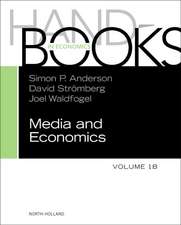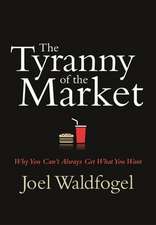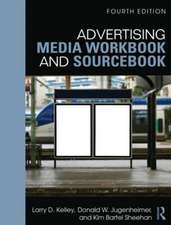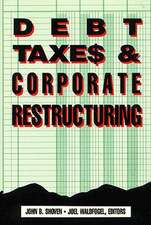Handbook of Media Economics, vol 1A
Editat de Simon P. Anderson, Joel Waldfogel, David Strombergen Limba Engleză Hardback – 2 dec 2015
The book spans the large scope of media economics, simultaneously offering in-depth analysis of particular topics, including the economics of why media are important, how media work (including financing sources, institutional settings, and regulation), what determines media content (including media bias), and the effects of new technologies. The book provides a powerful introduction for those interested in starting research in media economics.
- Helps academic and non-academic economists understand recent rapid changes in theoretical and empirical advances, in structural empirical methods, and in the media industry's connection with the democratic process
- Presents the only detailed summary of media economics that emphasizes political economy, merger policy, and competition policy
- Pays special attention to the economic influences of the Internet, including developments in social media, user-generated content, and advertising, as well as the Internet's effects on newspapers, radio, and television
Preț: 623.58 lei
Preț vechi: 860.86 lei
-28% Nou
Puncte Express: 935
Preț estimativ în valută:
119.34€ • 124.13$ • 98.52£
119.34€ • 124.13$ • 98.52£
Carte tipărită la comandă
Livrare economică 07-21 aprilie
Preluare comenzi: 021 569.72.76
Specificații
ISBN-13: 9780444627216
ISBN-10: 0444627219
Pagini: 562
Dimensiuni: 191 x 235 x 33 mm
Greutate: 1.32 kg
Editura: ELSEVIER SCIENCE
ISBN-10: 0444627219
Pagini: 562
Dimensiuni: 191 x 235 x 33 mm
Greutate: 1.32 kg
Editura: ELSEVIER SCIENCE
Public țintă
Primary: graduate students and professors worldwide studying media economics, as well as those working in industrial organization and microeconomicsSecondary: non-academic economists worldwide working in regulation and competition policy
Cuprins
I: Media Market Structure and Performance
1. Preference Externalities in Media Markets. Simon Anderson and Joel Waldfogel
2. Advertising Finance and Two Sided Business Models. Simon Anderson and Bruno Jullien
3. Empirics of Media Markets. Steven Berry and Joel Waldfogel
4. Economics of Advertising. Regis Renault
5. Audience Behavior and Ad Response. Ken Wilbur
6. Merger Policy and Regulation in Media Industries. Oystein Foros, Hans Jarle Kind and Lars Sorgard
II: Sectors
7. Television. Mark Armstrong and Greg Crawford
8. Radio. Andrew Sweeting
9. Newspapers and Magazines. Chandra Ambarish and Ulrich Kaiser
10. Media Economics of the Internet. Martin Peitz and Markus Reisinger
11. Privacy and the Internet. Catherine Tucker
12. User-Generated Content. Michael Luca
III: The Political Economy of Mass Media
13. Media Coverage and Influence on Government. David Stromberg
14. Media Bias in the Marketplace: Theory. Daniel Stone, Matthew Gentzkow and Jesse Shapiro
15. Media Bias in the Marketplace: Empirics. Riccardo Puglisi and James M. Snyder
16. Government Influence on Media: Theory. Andrea Prat
17. Government Influence on Media: Empirics. Ruben Enikolopov and Maria Petrova
18. The Role of Media in Finance. Paul Tetlock
19. Media and Social and Economic Outcome. Stefano Della Vigna and Eliana La Ferrara
1. Preference Externalities in Media Markets. Simon Anderson and Joel Waldfogel
2. Advertising Finance and Two Sided Business Models. Simon Anderson and Bruno Jullien
3. Empirics of Media Markets. Steven Berry and Joel Waldfogel
4. Economics of Advertising. Regis Renault
5. Audience Behavior and Ad Response. Ken Wilbur
6. Merger Policy and Regulation in Media Industries. Oystein Foros, Hans Jarle Kind and Lars Sorgard
II: Sectors
7. Television. Mark Armstrong and Greg Crawford
8. Radio. Andrew Sweeting
9. Newspapers and Magazines. Chandra Ambarish and Ulrich Kaiser
10. Media Economics of the Internet. Martin Peitz and Markus Reisinger
11. Privacy and the Internet. Catherine Tucker
12. User-Generated Content. Michael Luca
III: The Political Economy of Mass Media
13. Media Coverage and Influence on Government. David Stromberg
14. Media Bias in the Marketplace: Theory. Daniel Stone, Matthew Gentzkow and Jesse Shapiro
15. Media Bias in the Marketplace: Empirics. Riccardo Puglisi and James M. Snyder
16. Government Influence on Media: Theory. Andrea Prat
17. Government Influence on Media: Empirics. Ruben Enikolopov and Maria Petrova
18. The Role of Media in Finance. Paul Tetlock
19. Media and Social and Economic Outcome. Stefano Della Vigna and Eliana La Ferrara
Recenzii
"This Handbook provides a very useful overview of the economic literature on the media, a literature that has grown tremendously in the last few decades. Now we will have one single place to go when in need of accessing state-of the-art knowledge in this research area. It is particularly welcome that the editors have collected surveys both across the various media industries and across the main market-structure and political-economy issues." --Tore Nilssen, University of Oslo
"At last the long-awaited handbook on the economics of media! Despite 15 years of high quality research, the field has suffered from the lack of systematic and comprehensive presentation. This handbook not only illustrates the basic economic forces shaping traditional and new media markets but also analyses the relationship between media markets and politics. I plan to use it in my graduate and doctoral courses. It will also help academics considering new research in the field." --Lapo Filistrucchi, University of Florence and Tilburg University
"At last the long-awaited handbook on the economics of media! Despite 15 years of high quality research, the field has suffered from the lack of systematic and comprehensive presentation. This handbook not only illustrates the basic economic forces shaping traditional and new media markets but also analyses the relationship between media markets and politics. I plan to use it in my graduate and doctoral courses. It will also help academics considering new research in the field." --Lapo Filistrucchi, University of Florence and Tilburg University











